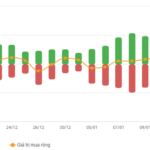This survey, conducted by Jobs_that_makesense Asia (a platform focused on jobs that promote social and environmental progress) and Manpower (a human resource solutions provider), polled mostly working individuals and a small group of students about to enter the workforce.
COMPENSATION AND STABILITY ARE PRIORITIES FOR WORKERS
The report, titled “Finding Meaning in Work,” is the first survey to explore the pursuit of meaningful work in Southeast Asia.
Analyzing feedback from 2,023 participants across six Southeast Asian countries, including 274 from Vietnam, the report aims to understand the perspectives of today’s workforce on meaningful work.
According to the report, when seeking new employment, 40% of respondents in Vietnam prioritize compensation and job stability. Additionally, one-third value career advancement and personal development.
Interestingly, the pursuit of higher compensation is not driven by a desire for greater wealth but by the need to provide and ensure a comfortable life for their families.
Maintaining a positive work-life balance is crucial for 26% of respondents, and 85% believe that a company’s reputation for social responsibility influences their decision to work there.
The report also reveals that while 99% of Vietnamese respondents consider finding meaning in work important, only about one in ten (11%) feel “very satisfied” with the level of meaning their current job provides—the lowest rate in Southeast Asia.
This presents a significant opportunity for employers to set themselves apart in today’s competitive talent landscape.
Moreover, over 87% of Vietnamese respondents agree that promoting diversity, equity, and inclusion in the workplace, along with other social goals, pioneering sustainable initiatives (64%), and improving working conditions (flexible work hours, comprehensive health insurance, and pay equity – 61%) are actions that businesses can take to enhance job meaningfulness for employees.
The top three challenges faced by respondents in Vietnam when seeking meaningful work are limited green and community job opportunities, balancing personal responsibilities with career aspirations, and lacking the necessary skills and work experience.

Across Southeast Asia, the survey finds that more than half of respondents expect their companies to pioneer sustainable initiatives. They also support businesses creating more positions linked to environmental, social, and governance (ESG) responsibilities and providing employee training on social impact and sustainability.
JOBS ARE BECOMING INCREASINGLY LINKED TO SUSTAINABILITY
Léa Klein, CEO of Jobs_that_makesense Asia, shares that in the last three years, they have witnessed a significant shift in this regard.
“We are seeing a positive transformation, with an increasing number of diverse jobs being linked to sustainability efforts. To achieve the region’s sustainability goals by 2030, these efforts need to be accelerated. Workers are increasingly committed to contributing to sustainability,” she says.
This underscores the need for more sustainability-oriented jobs and skills enhancement programs.
“By embedding sustainability into every level of employment within businesses, these positions will become the new norm and ensure the region’s success on its sustainability journey,” emphasizes Klein.
Francois Lancon, Chairman of ManpowerGroup Asia Pacific and the Middle East, also believes that with the strong development of automation, artificial intelligence (AI), and ESG factors that are reshaping industries and economies, leaders have a unique opportunity to create purposeful and meaningful jobs.
According to Lancon, business leaders need the courage to create opportunities that provide the meaningful work today’s workforce craves.
Simon Matthews, ManpowerGroup’s Southeast Asia Managing Director, has also observed a pivotal shift in the attitudes and expectations of Vietnamese workers towards businesses, work environments, and the nature of their jobs in the past year.
“With profound changes in the perspectives of Vietnam’s workforce, a company’s commitment to social and environmental responsibility has become an essential factor influencing career decisions,” says Matthews.
He adds that to attract and retain talent, businesses must not only prioritize ethical practices and sustainable initiatives but also actively demonstrate them through concrete actions.
Matthews emphasizes that by fostering a culture of ethical integrity and sustainability, businesses can build a positive image as not just ideal employers but also as responsible contributors to society and the environment.














